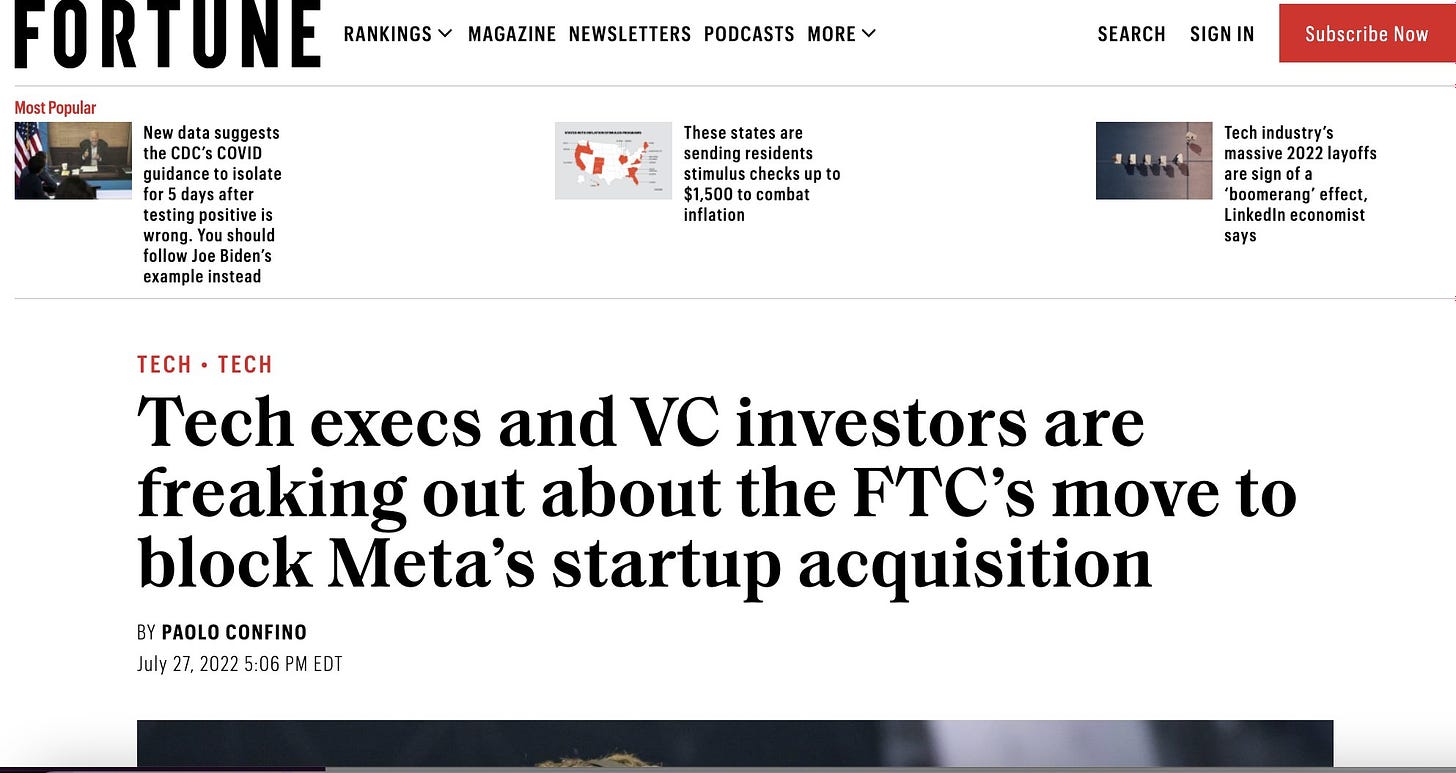Law and Order Lina
A more aggressive FTC isn't 'upending' antitrust standards. It is returning the rule of law to U.S. markets.
Welcome to BIG, a newsletter on the politics of monopoly power. If you’d like to sign up to receive issues over email, you can do so here.
Over the past few days, there’s been a lot of commentary around the Federal Trade Commission’s challenge to Mark Zuckerberg’s roll-up of the virtual reality space, specifically its objection to Meta’s purchase of VR app producer Within. Some of us were excited, naturally, since this act shows that Chair Lina Khan is actually delivering on her pledge to restore vigorous enforcement.
It’s worth highlighting that Khan didn’t do it alone, her fellow commissioners Rebecca Kelly Slaughter and Alvaro Bedoya supported this aggressive challenge. While it’s easy to take such support for granted, we shouldn’t do that. It’s fairly common to have a weak fifth commissioner in an administrative agency blocking a strong Chair, but that does not seem to be the case with this FTC. It is Republicans Christine Wilson and Noah Philips who are, as usually, helping big tech against the wishes of their own conservative voters, but there is no weak Dem they can as yet exploit.
Still, the commentary hasn’t been all positive. In fact, a lot of venture capitalists, prominent CEOs aligned with big tech, and antitrust establishment types have kicked up a storm over the move.
They offers two basic objections which are worth considering. The first is that prohibiting these kinds of acquisitions will chill investment. And the second is that the FTC is operating outside the law. Neither, in my view, is correct.
Let’s start with objection number one, which is that stopping these acquisitions will end entrepreneurship. Here’s Box CEO Aaron Levie making that point in the New York Times.
“Regulators predicting future markets is a very, very dangerous precedent and position,” said Aaron Levie, the chief executive of the cloud storage company Box. He warned that venture capitalists and entrepreneurs would become wary of going into new markets if regulators cut off the ability of companies like Meta to buy start-ups.
Levie’s assumption, and one widely held among financiers, is that people only start companies with the hopes of selling out to large technology firms. There is certainly a kind of business model for which being acquired by a monopolist is the ‘liquidity event’ for the founder, but that’s not the only or most common rationale for starting a business. In fact, prior to the monopoly-friendly policy framework fostered in the 1980s, people started businesses to build something. In both cases they sought to get rich, it’s just that it used to be that having a profit stream and going public in the capital markets was the end goal. Such a framework worked both ways; large firms, since they couldn’t buy their research through acquisitions, had big corporate labs where engineers constantly churned out innovations. (That is indeed why Meta is pouring money into VR, it was blocked from creating a currency and it simply can’t bludgeon its way into new markets. It has to innovate)
Regardless, that people start businesses simply to get bought by monopolists is mostly a theoretical argument, one that is not supported by the historical record. And there’s a far more important question that is not hypothetical at all - what do *existing* firms in the market think about this acquisition? The evidence there is much more concrete. Existing firms in the virtual reality market do not like this acquisition. According to the Capitol Forum, third parties who make apps or tools are terrified that, if this merger goes through, Meta will block rival apps from access to its headset and app store. Basically, if you are selling a fitness app that competes with Meta’s fitness app, now Meta has a real incentive and the ability to block you from getting into the market.
These third parties are also afraid that Meta will withhold “the Supernatural app from rival VR headset manufacturers post merger, making it harder for them to challenge the company’s headset dominance.” Basically Meta wants to fortify its market power in two ways, wielding must-have apps to block new headset makers and to use its headset monopoly to block rival apps.
Remember, this isn’t theoretical, these are actual firms in the market saying they want this deal blocked, firms that were funded to compete in this market selling software with the goal of making a profit, not necessarily with the goal of getting acquired. In other words, the argument that acquisitions to fortify monopoly power are necessary for innovation is simply not consistent with what innovators in the affected market are actually saying.
Objection two is that the FTC is somehow operating outside the bounds of antitrust law. This too is untrue. In 1973, the U.S. Supreme Court, in US v Falstaff Brewing, validated the theory that the FTC is using in this case, which is that an acquisition that removes a ‘potential competitor’ from the market is illegal. In that case, a large beer producer Respondent Falstaff tried to buy its way into the New England market, but was blocked because it also had the capacity to enter on its own without the merger. The Supreme Court called such a merger illegal because the buyer “was a potential competitor in the sense that its position on the edge of the market exerted a beneficial influence on the market's competitive conditions.” This ‘potential competitor’ test was also used in a district court that same year, US v Phillips petroleum, over a similar firm on the edge of the market trying to buy its way in.
The idea of potential competition is well-accepted by all sides. The antitrust establishment uses the idea of potential competition to make the argument that mergers are almost always fine. After all, potential competitors outside the market can discipline the dominant firm. Profit margins that are too high, they would say, entice entrants, and therefore firms that seem to have market power would not dare exploit it. Market power is illusory, in their view, because of potential competition. The law, however, as explained by the Supreme Court in Falstaff, presumes the opposite. Mergers that threaten competition, even if it is merely potential competition, are illegal. So the law is on the side of Khan, not the people saying she has an uphill fight.
Of course, this doesn’t mean she’ll win. Judges are unpredictable. Moreover, it’s not always the case that potential competition inhibits mergers. Such potential competition must be placed on the ‘edge’ of the market, meaning that it has to be something that market participants take into account in their business decisions. For instance, this newsletter, if I decided to go and get financing and hire developers, could theoretically enter the market for virtual reality software. But no one in the industry takes that possibility into account because I am neither likely nor well-positioned to do so. However, Meta is very clearly well-positioned to enter any part of the virtual reality market it so chooses. It owns the dominant headset and app store, as well as the most popular apps and VR toolsets. And Mark Zuckerberg has made it clear that his corporation seeks to have control over the killer apps on this computing platform. There is no way that existing market participants plan their moves without taking Meta’s potential actions into account. Therefore, Meta’s potential entrance into the fitness app space has a beneficial effect on the market, since Within always knows that if its product isn’t good enough, Meta could decide to enter and win.
At any rate, this is a fascinating challenge, and win or lose, it’ll reverberate in a lot of different ways.




If people are starting new companies with the intent of selling them (instead of making money from a product), isn't that the most obvious possible signal there's a market power problem?